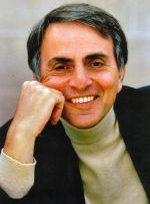Carl Sagan
Just imagine for a minute that Carl Sagan had been given a drug test for his job at NASA. Carl Sagan would have failed miserably with a high content of THC in his urine because he had been a regular pot smoker since the 1960’s. He would have been blacklisted by the scientific community and then would have found himself unemployable in his profession. If Carl Sagan had been tested for THC, we would have lost one of the world’s most brilliant scientists and he would not have had the chance to go on and win the Pulitzer Prize. Carl Sagan was not tested for THC and the whole world has profited as a result. Following is an article outlining the accomplishments of our pot smoker of the month.
Carl Sagan has played a leading role in the American space program since its inception. He has been a consultant and adviser to NASA since the 1950s, briefed the Apollo astronauts before their flights to the Moon, and was an experimenter on the Mariner, Viking, Voyager, and Galileo expeditions to the planets. He helped solve the mysteries of the high temperature of Venus (a massive greenhouse effect), the seasonal changes on Mars (windblown dust) and the reddish haze of Titan (complex organic molecules).
For his work, Dr. Sagan has received the NASA Medals for Exceptional Scientific Achievement and for Distinguished Public Service twice, as well as the NASA Apollo Achievement Award.
Asteroid 2709 Sagan is named after him. He has also been given the John F. Kennedy Astronautics Award of the American Astronautical Society, the Explorers Club 75th Anniversary Award, the Konstantin Tsiolokovsky Medal of the Soviet Cosmonautics Federation, and the Masursky Award of the American Astronomical Society:
…for his extraordinary contributions to the development of planetary science. As a scientist trained in both astronomy and biology, Dr. Sagan made seminal contributions to the study of planetary atmospheres, planetary surfaces, the history of the Earth, and exobiology. Many of the most productive planetary scientists working today are his present and former students and associates.
He is also the 1994 recipient of the Public Welfare Medal, the highest award of the National Academy of Sciences for “distinguished contributions in the application of science to the public welfare.”
This award read as follows:
Carl Sagan has been enormously successful in communicating the wonder and importance of science. His ability to capture the imagination of millions and to explain difficult concepts in understandable terms is a magnificent achievement.
Dr. Sagan served as Chairman of the Division of Planetary Sciences of the American Astronomical Society, as President of the Planetology Section of the American Geophysical Union, and as Chairman of the Astronomy Section of the American Association for the Advancement of Science.
For 12 years he was Editor in Chief of Icarus, the leading professional journal devoted to planetary research. He was the cofounder and first President of The Planetary Society and a Distinguished Visiting Scientist at the Jet Propulsion Laboratory, California Institute of Technology.
A Pulitzer Prize winner, Dr. Sagan is the author of many bestsellers, including Cosmos, which became the best-selling science book ever published in the English language. The accompanying Emmy and Peabody award-winning television series has been seen by 500 million people in 60 countries. He received 20 honorary degrees from American colleges and universities for his contributions to science, literature, education, and the preservation of the environment.
At the time of his death on December 20, 1996, he served as the David Duncan Professor of Astronomy and Space Sciences and Director of the Laboratory for Planetary Studies at Cornell University. Dr. Sagan’s The Demon-Haunted World: Science as a Candle in the Dark was released by Random House in March 1996. A collection of writings called Billions and Billions was published posthumously. He is co-producer and co-writer of the acclaimed Warner Brothers movie Contact, based on his novel.
